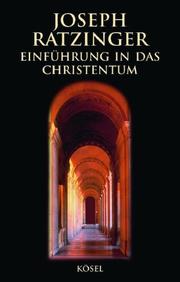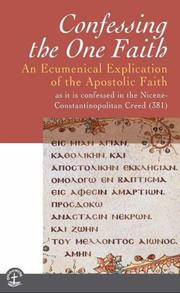| Listing 1 - 10 of 37 | << page >> |
Sort by
|

ISBN: 3466204550 9783466204557 Year: 2000 Publisher: München : Kösel,
Abstract | Keywords | Export | Availability | Bookmark
 Loading...
Loading...Choose an application
- Reference Manager
- EndNote
- RefWorks (Direct export to RefWorks)
Katholische Theologie. --- Christentum. --- Catholic Church --- Doctrines. --- Apostolisches Glaubensbekenntnis. --- Apostolisches Glaubensbekenntnis
Book
Abstract | Keywords | Export | Availability | Bookmark
 Loading...
Loading...Choose an application
- Reference Manager
- EndNote
- RefWorks (Direct export to RefWorks)
Beschluss. --- Entscheidung. --- Glaubensbekenntnis. --- Kirchliches Lehramt. --- Konzil. --- Catholic Church --- Catechisms and creeds --- Latin. --- Doctrinal and controversial works.
Book

ISBN: 3657788999 350678899X Year: 2018 Publisher: Paderborn Brill | Schöningh
Abstract | Keywords | Export | Availability | Bookmark
 Loading...
Loading...Choose an application
- Reference Manager
- EndNote
- RefWorks (Direct export to RefWorks)
Ein christologischer Entwurf aus dem Dialog zwischen Dogmatik und Liturgie sowie zwischen Judentum und Christentum. Christologie begründet die Rede von Jesus als dem Christus, d. h. dem Messias Gottes. Sie vertritt also einen theologischen Wahrheitsanspruch. Wird die Christologie jedoch nur von der Wahrheitsfrage bestimmt, kann sie leicht den lebendigen Zugang des Glaubens zur geheimnisvollen und unvergleichlichen Individualität Jesu verstellen. Dieser Gefahr begegnet der Autor durch eine mystagogische Christologie. Sie ist orientiert an den Hochfesten der erneuerten Römischen Liturgie. Der Autor führt zur Mystik dieses Festkreises hin und erschließt die Gestalt Jesu Christi in ihrer Heilsbedeutsamkeit. 25 Jahre nach dem Ersterscheinen wird dieser christologische Entwurf in erweiterter Form präsentiert.
Glaubensbekenntnis --- Credo --- Christologie --- Christentum --- Weihnachten --- Jesus von Nazareth --- Ostern --- Mystagogik --- Liturgie --- Judentum --- Pfingsten
Book
ISBN: 3896650661 Year: 1998 Publisher: Sankt Augustin Academia Verlag
Abstract | Keywords | Export | Availability | Bookmark
 Loading...
Loading...Choose an application
- Reference Manager
- EndNote
- RefWorks (Direct export to RefWorks)
Scientology --- die Ethik-Konzeption Hubbards --- Anti-Personen --- SP --- PTS --- Hubbards Gesellschaftskritik --- Kinder --- Glaubensbekenntnis
Book
ISBN: 9783161615986 3161615980 9783161639302 Year: 2024 Publisher: Tübingen: Mohr Siebeck,
Abstract | Keywords | Export | Availability | Bookmark
 Loading...
Loading...Choose an application
- Reference Manager
- EndNote
- RefWorks (Direct export to RefWorks)
Were ancient Christian creeds designed as summaries of Scripture, or, conversely, was the formation of Scripture itself subject to creedal as well as canonical considerations? To what extent were there non-Christian antecedents and analogies to the church's habit of making creeds? The contributors to this volume investigate the relationship between Scripture and ancient Christian creeds. The essays in this volume are divided into four sections devoted to related lines of inquiry. The first asks whether the Christian creeds are sui generis as sometimes claimed, or whether there are close analogies in Jewish and Graeco-Roman antiquity. The second section investigates key critical issues in scholarly study of the creeds. The third turns to case studies illustrating how early Christian writers deploy the creeds in their engagement with scriptural topics. The fourth section turns to thematic studies in the creed.
Glaubensbekenntnis --- Schriftlichkeit --- Frühchristentum --- Bekenntnisschriften --- Textgeschichte --- Creeds --- Fathers of the church --- History and criticism
Book
ISBN: 9782220059020 2220059022 Year: 2008 Publisher: Paris Desclée de Brouwer
Abstract | Keywords | Export | Availability | Bookmark
 Loading...
Loading...Choose an application
- Reference Manager
- EndNote
- RefWorks (Direct export to RefWorks)
Bien souvent au cours de la messe, le credo se trouve récité de manière mécanique, sans guère d'attention aux formules qui le composent. Pour beaucoup, cette profession de foi apparaît plus comme un ensemble de concepts théologiques ou intellectuels que comme l'invitation à une expérience spirituelle. A rebours de cette approche immédiate, Mgr Michel Dubost propose de " prier le Credo ", c'est-à-dire de revenir à sa source, sa profondeur. C'est l'occasion d'éclaircie des expressions difficiles ou qui peuvent sembler abstraites, de voir plus clair dans des textes qui prennent leur origine dans les premiers temps de l'Eglise. Les prier, les méditer, mais aussi les proclamer en communauté, autant de richesses qui sont accessibles à tout chrétien.
Apostles' Creed. --- Apostolicum --- Symbolum Apostolicum --- Symbolum Apostolorum --- Apostolisches Glaubensbekenntnis --- Symbole des apôtres --- Christian Creed --- Christian Faith --- Praying
Book
ISBN: 220402760X 9782204027601 Year: 1987 Publisher: Paris: Cerf,
Abstract | Keywords | Export | Availability | Bookmark
 Loading...
Loading...Choose an application
- Reference Manager
- EndNote
- RefWorks (Direct export to RefWorks)
Orthodox Eastern Church --- Creeds --- Nicene Creed --- Creeds. --- Nicene Creed. --- Niceno-Constantinopolitan Creed --- Symbolum Nicaenum --- Nicaenische Glaubensbekenntnis --- Nizänisches Glaubensbekenntnis --- Constantinopolitan Creed --- Credo des Conciles de Nicée-Constantinople --- Symbolum Constantinopolitanum --- Glaubensbekenntnis von Nizäa-Konstantinopel --- Nikaian-Konstantinopolin uskontunnustus --- NK --- Σύμβολον της Πίστεως --- Symvolon tēs Pisteōs --- Icon/Symbol of the Faith --- Profession of Faith of the 318 Fathers --- Profession of Faith of the 150 Fathers --- Credo (Nicene Creed)

ISBN: 2825410365 9782825410363 Year: 1999 Volume: 153 Publisher: Geneva: WCC,
Abstract | Keywords | Export | Availability | Bookmark
 Loading...
Loading...Choose an application
- Reference Manager
- EndNote
- RefWorks (Direct export to RefWorks)
238.2 --- 238.2 Symbola. Artikelen van het geloof --- Symbola. Artikelen van het geloof --- Nicene Creed. --- Niceno-Constantinopolitan Creed --- Symbolum Nicaenum --- Nicaenische Glaubensbekenntnis --- Nizänisches Glaubensbekenntnis --- Constantinopolitan Creed --- Credo des Conciles de Nicée-Constantinople --- Symbolum Constantinopolitanum --- Glaubensbekenntnis von Nizäa-Konstantinopel --- Nikaian-Konstantinopolin uskontunnustus --- NK --- Σύμβολον της Πίστεως --- Symvolon tēs Pisteōs --- Icon/Symbol of the Faith --- Profession of Faith of the 318 Fathers --- Profession of Faith of the 150 Fathers --- Credo (Nicene Creed) --- Nicene Creed --- #gsdb4
Book
ISBN: 2220025756 9782220025759 Year: 1985 Publisher: Paris: Desclée De Brouwer,
Abstract | Keywords | Export | Availability | Bookmark
 Loading...
Loading...Choose an application
- Reference Manager
- EndNote
- RefWorks (Direct export to RefWorks)
#GBIB:SMM --- Apostles Creed --- Nicene Creed --- #GGSB: Catechismus- geloofsbelijdenis --- #GGSB: Dogmatiek --- #GGSB: Geloof --- Apostles' Creed. --- Nicene Creed. --- Niceno-Constantinopolitan Creed --- Symbolum Nicaenum --- Nicaenische Glaubensbekenntnis --- Nizänisches Glaubensbekenntnis --- Constantinopolitan Creed --- Credo des Conciles de Nicée-Constantinople --- Symbolum Constantinopolitanum --- Glaubensbekenntnis von Nizäa-Konstantinopel --- Nikaian-Konstantinopolin uskontunnustus --- NK --- Σύμβολον της Πίστεως --- Symvolon tēs Pisteōs --- Icon/Symbol of the Faith --- Profession of Faith of the 318 Fathers --- Profession of Faith of the 150 Fathers --- Credo (Nicene Creed) --- Apostolicum --- Symbolum Apostolicum --- Symbolum Apostolorum --- Apostolisches Glaubensbekenntnis --- Symbole des apôtres --- Christian Creed --- Catechismus- geloofsbelijdenis --- Dogmatiek --- Geloof
Book
ISBN: 0773419241 9780773419247 9780773436008 0773436006 Year: 2010 Publisher: Lewiston : The Edwin Mellen Press,
Abstract | Keywords | Export | Availability | Bookmark
 Loading...
Loading...Choose an application
- Reference Manager
- EndNote
- RefWorks (Direct export to RefWorks)
Millions of Catholics and Protestants accept without question the Apostles' Creed, presuming that it contains the core Christian beliefs. Beginning with their catechumen training, they recite it weekly. It is among the most widely shared expressions by Christian worshipers throughout the world, although few unapologetic examinations of its contents have been published. Yet two-thirds of the creed's clauses are in part, or altogether, at odds with the central message of the New Testament. This study will: first, describe the way in which the Creed, which originated centuries after the apostolic
Apostles’ Creed. --- Religion --- Philosophy & Religion --- Christianity --- Apostles' Creed. --- Apostolicum --- Symbolum Apostolicum --- Symbolum Apostolorum --- Apostolisches Glaubensbekenntnis --- Symbole des apôtres --- Christian Creed
| Listing 1 - 10 of 37 | << page >> |
Sort by
|

 Search
Search Feedback
Feedback About UniCat
About UniCat  Help
Help News
News